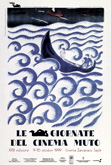
Le Giornate
del Cinema Muto
18th Pordenone
Silent Film Festival
Teatro Zancanaro, Sacile
9 - 16 October 1999
director: David Robinson
Sezioni
/Festival Features
Collegium Sacilense
An International School on the Cinema Heritage
To mark the close of the 20th century and the 2nd millennium, the Giornate del Cinema Muto has this year organised a "Collegium Sacilense" an international school dedicated to the understanding of the world film heritage. The Festival has always seen its primary mission as to promote knowledge, understanding and appreciation of this heritage. The 20th century has been the first era in history to possess the great communal audio-visual memory that the cinema provides, and its true value, potential use and the problems of conservation are even now only imperfectly understood, certainly by the larger public.
We are very conscious that our 600 visitors include practically all the leading international personalities involved with film history and heritage - archivists, historians, researchers, academics, museologists and those individual, private enthusiasts whose work has so often proved particularly invaluable to scholarship. With this in mind we have formed the plan for to bring together a small group of students from around the world, who will be given the opportunity to meet and learn from the world’s finest authorities on film history and film conservation. In this way we hope to contribute to the formation of a new generation - missionaries to the next century and the third millennium, equipped to carry on the work of promoting understanding of the unique cultural heritage of the moving image.
The overall theme of the Collegium - given the strategic timing of the 1999 Giornate, as the last major international event of the century dedicated to the film heritage - is the definition of an overall philosophy of cinema as the universal memory, along with the way that this philosophy affects and is affected by the more practical issues of conserving the cinema’s vast patrimony. Some themes for discussion will be the nature of the audio-visual memory; the value of this memory for future generations and the perceived fin-de-siĄcle urge to extinguish it; the problems of conservation and the principles of selection; the traditions, continuity and development of expertise.